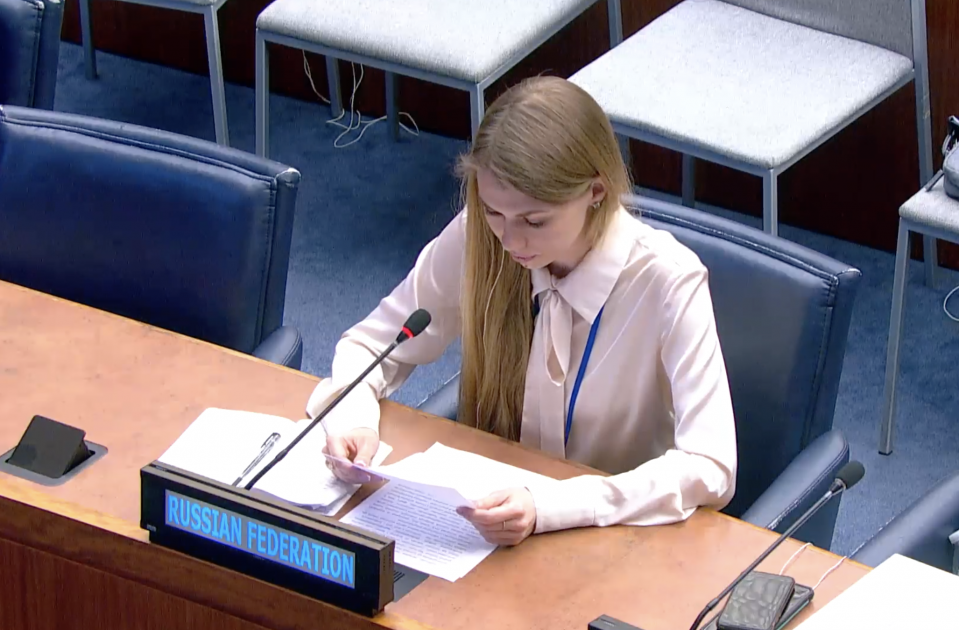Statement by Representative of the Russian Federation Ms.Irina Tyazhlova at the Seventh session of the UN Open-Ended Working Group on security of and in the use of ICTs 2021-2025 under agenda item “Regular institutional dialogue”
Mr. Chair,
Defining the format that will succeed the OEWG after 2025 becomes our key task for the remaining one and a half years of the Group’s activities. It is crucial to resolve this issue strictly by consensus taking into account the views of all States. It is necessary to do so within the OEWG rather than outside of it. This is precisely the agreement enshrined in the second annual report adopted by consensus.
We consider absolutely unacceptable the attempts by a number of States to push forward a decision that meets their interests – through a simple majority in the General Assembly. This approach is not shared by Member States, primarily developing countries, which have long sought the opportunity to directly participate in the negotiation process on fundamental issues of ensuring information security. All the more so, given the number of constructive ideas and proposals in this regard put forward within the OEWG.
We assume that the future platform should provide equal conditions for all participating States, rather than be tailored for the interests of certain countries to the detriment of the interests of others. In this sense, the open-ended working group format has proved solid and efficient in practice. Since 2018, it has managed to garner trust and support of an overwhelming majority in the UN. We consider it reasonable to preserve our common heritage by creating a permanent decision-making OEWG after 2025.
I would like to recall that at the previous OEWG session in December 2023, a group of 13 States (Belarus, Burundi, Cuba, DPRK, Eritrea, Mali, Myanmar, Nicaragua, Russia, Syria, Sudan, Venezuela and Zimbabwe) submitted a relevant concept paper. Its detailed version is available at the OEWG website. I will dwell on a few fundamental points.
It is necessary to ensure continuity between the new body and the preceding groups. This relates, first and foremost, to the principle of consensus in decision-making. There is no doubt that States face difficulties elaborating universal arrangements that meet the interests of all. However, practice shows that this is possible and this is the way to develop the most effective, result-oriented solutions. One clear evidence of this is the agreement reached in July 2023 on the establishment of a global intergovernmental Points of Contact Directory for exchange of information on computer attacks/incidents.
The mandate of the permanent OEWG should focus on further promoting the creation of an open, secure, stable, accessible and peaceful ICT environment through the practical implementation of the agreements reached in the current Group. In our view, the future mechanism should work, as a priority, towards the development of legally binding rules, norms and principles of responsible behavior of States as elements of a future universal treaty on international information security. The emphasis should also be laid on adapting international law taking into account the specifics of ICTs, launching mechanisms for practical cooperation between States and confidence-building measures, as well as on creating specific programs/funds to assist in strengthening the capacities of countries in the field of information security. The implementation of a set of all these measures will allow us to ultimately shape an effective mechanism for the prevention and peaceful resolution of interstate conflicts in the global information space. Our idea of a permanent OEWG easily integrates other national initiatives, such as the Indian proposal to create a global web portal.
As far as the Chair’s discussion paper on a permanent mechanism on ICT security is concerned, it is regrettable that it was circulated among States just before the session. The paper is under interagency consideration. However, even at the first glance, we note that it lacks an accurate description of the mandate of the future body, as well as the key element for us which is the development of new legally binding agreements. It is also unclear why the document mentions only one of the officially presented national initiatives for regular institutional dialogue.
For our part, we are ready to constructively engage in further work on the draft in order to create a negotiation mechanism on international information security that meets the interests of all countries, with the understanding that the fundamental elements of our approach will be taken into account.
Thank you for your attention.
